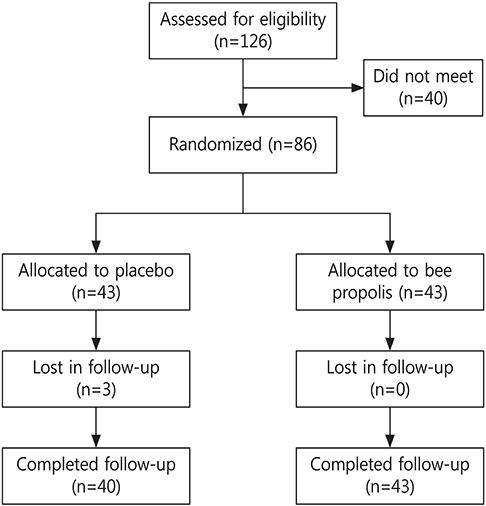Obstet Gynecol Sci.
2019 Sep;62(5):352-356. 10.5468/ogs.2019.62.5.352.
The effect of bee prepolis on primary dysmenorrhea: a randomized clinical trial
- Affiliations
-
- 1Autism Spectrum Disorders Research Center, Hamadan University of Medical Sciences, Hamadan, Iran.
- 2Midwife in Social Security Organization, Hamadan, Iran. barshimah@yahoo.com
- 3Research Center for Health Sciences, Hamadan University of Medical Sciences, Hamadan, Iran.
- 4Mother and Child Care Research Center, School of Nursing and Midwifery, Hamadan University of Medical Sciences, Hamadan, Iran.
- 5Medical Degree in Social Security Organization, Hamadan, Iran.
- 6Research Center for Health Sciences, Hamadan University of Medical Sciences, Hamadan, Iran.
- KMID: 2456831
- DOI: http://doi.org/10.5468/ogs.2019.62.5.352
Abstract
OBJECTIVE
Primary dysmenorrhea typically occurs with no associated pelvic pathology and is common in adolescents and young women. This study evaluated the effect of bee propolis on relief of primary dysmenorrhea.
METHODS
The study was performed in 2018 in Hamadan, in western Iran, among female students with primary dysmenorrhea. Participants were randomly divided into two groups, using balanced block randomization, and were administered a placebo or bee propolis capsules for 5 days during two menstruation cycles. The number of participants required was estimated to be 86 in total, with 43 students in each group according to the inclusion criteria. We used the visual analog scale to assess pain severity. The independent t-test was conducted for comparing between two groups, using SPSS 16.0.
RESULTS
A significant change was found in the mean pain scores during the first (P<0.001) and second (P<0.001) months after using bee propolis in comparison with placebo. The means of the pain scores in the bee propolis group were 5.32±2.28 and 4.74±2.40 in first and second months after the intervention, respectively, whereas the means of the pain scores in the placebo group were 7.40±1.21 and 7.17±1.24 in first and second months after the intervention, respectively.
CONCLUSION
Our study showed that the use of bee propolis for two months compared with placebo reduced primary dysmenorrhea during the first and second months after use, with no adverse effects. Therefore, it could be used as an alternative to nonsteroidal anti-inflammatory drugs for relief of primary dysmenorrhea.
Keyword
MeSH Terms
Figure
Reference
-
1. Kannan P, Chapple CM, Miller D, Claydon LS, Baxter GD. Menstrual pain and quality of life in women with primary dysmenorrhea: rationale, design, and interventions of a randomized controlled trial of effects of a treadmill-based exercise intervention. Contemp Clin Trials. 2015; 42:81–89.
Article2. Chen HM, Chen CH. Effects of acupressure on menstrual distress in adolescent girls: a comparison between Hegu-Sanyinjiao matched points and Hegu, Zusanli single point. J Clin Nurs. 2010; 19:998–1007.
Article3. Meda A, Lamien CE, Millogo J, Romito M, Nacoulma OG. Therapeutic uses of honey and honeybee larvae in central Burkina Faso. J Ethnopharmacol. 2004; 95:103–107.
Article4. Potharaju J, Usha P. Prevalence of primary dysmenorrhea in young women-an institutional study. J Evol Med Dent Sci. 2017; 6:6948–6951.5. Jenabi E, Fereidoony B. Effect of Achillea millefolium on relief of primary dysmenorrhea: a double-blind randomized clinical trial. J Pediatr Adolesc Gynecol. 2015; 28:402–404.
Article6. Dmitrovic R, Kunselman AR, Legro RS. Sildenafil citrate in the treatment of pain in primary dysmenorrhea: a randomized controlled trial. Hum Reprod. 2013; 28:2958–2965.
Article7. Sostres C, Gargallo CJ, Arroyo MT, Lanas A. Adverse effects of non-steroidal anti-inflammatory drugs (NSAIDs, aspirin and coxibs) on upper gastrointestinal tract. Best Pract Res Clin Gastroenterol. 2010; 24:121–132.
Article8. Shobeiri F, Nazari S, Nazari S, Jenabi E, Shayan A. Effect of Menstrugole on primary dysmenorrhea: a randomized clinical trial. Obstet Gynecol Sci. 2018; 61:684–687.
Article9. Jenabi E, Asle Toghiri M, Hejrati P. The comparison of the effects of antiplain of valeriana officinalis risom and mefenamic acid in relief of primary dismenorrhea. Iran J Obstet Gynecol Infertil. 2012; 15:42–47.10. Amiri Farahani ËL, Hasanpoor-Azghdy SB, Kasraei H, Heidari T. Comparison of the effect of honey and mefenamic acid on the severity of pain in women with primary dysmenorrhea. Arch Gynecol Obstet. 2017; 296:277–283.
Article11. Golder W. Propolis. The bee glue as presented by the Graeco-Roman literature. Wurzbg Medizinhist Mitt. 2004; 23:133–145.12. Haji Sharifi A. Iranian encyclopedia of honey therapy. Tehran: Hafeze Novin;2013.13. Bueno-Silva B, Alencar SM, Koo H, Ikegaki M, Silva GV, Napimoga MH, et al. Anti-inflammatory and antimicrobial evaluation of neovestitol and vestitol isolated from Brazilian red propolis. J Agric Food Chem. 2013; 61:4546–4550.
Article14. Koblovská R, Macková Z, Vítková M, Kokoska L, Klejdus B, Lapcík O. Isoflavones in the Rutaceae family: twenty selected representatives of the genera Citrus, Fortunella, Poncirus, Ruta and Severinia. Phytochem Anal. 2008; 19:64–70.15. Paulino N, Dantas AP, Bankova V, Longhi DT, Scremin A, de Castro SL, et al. Bulgarian propolis induces analgesic and anti-inflammatory effects in mice and inhibits in vitro contraction of airway smooth muscle. J Pharmacol Sci. 2003; 93:307–313.
Article16. Al-Waili NS. Effects of honey on the urinary total nitrite and prostaglandins concentration. Int Urol Nephrol. 2005; 37:107–111.
Article17. Al-Waili NS. Natural honey lowers plasma glucose, C-reactive protein, homocysteine, and blood lipids in healthy, diabetic, and hyperlipidemic subjects: comparison with dextrose and sucrose. J Med Food. 2004; 7:100–107.
Article18. Ajorpaz NM, Hafezi M, Salehi S, Tayebi A, Shenasa F, Zahtabchi S. Comparing the effect of pure and impure honey on severity of pain, amount of bleeding, and duration and interval of menstrual cycles in female students with primary dysmenorrhea. 2012; 2:23–33.19. Ostad SN, Soodi M, Shariffzadeh M, Khorshidi N, Marzban H. The effect of fennel essential oil on uterine contraction as a model for dysmenorrhea, pharmacology and toxicology study. J Ethnopharmacol. 2001; 76:299–304.
Article
- Full Text Links
- Actions
-
Cited
- CITED
-
- Close
- Share
- Similar articles
-
- Effect of Menstrugole on primary dysmenorrhea: a randomized clinical trial
- Comparison of the effect of vitamin E, vitamin D and ginger on the severity of primary dysmenorrhea: a single-blind clinical trial
- Vitamin D supplementation for primary dysmenorrhea: a double-blind, randomized, placebo-controlled trial
- Primary Dysmenorrhea
- Bee Venom Therapy for Musculoskeletal Disorders


